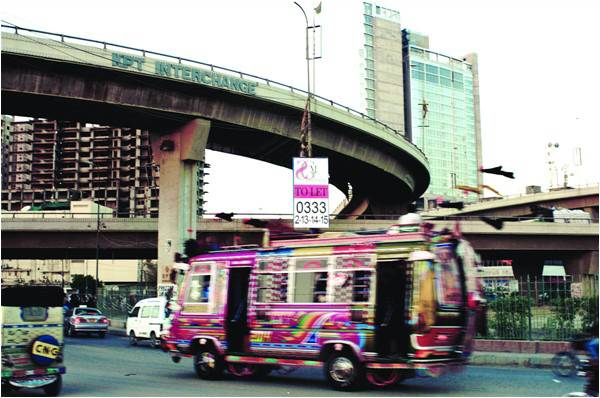
The start of the day is not auspicious. There is no water in the tap. I go outside and ask the chowkidar to get the motor running to lift water from the underground tank to the overhead tank. He informs me that there is no water as the tanker wallahs have gone on strike. Someone in the government has accused them of stealing water through the hydrants. This is an unkind cut – all we receive from the Karachi Municipal Corporation is a bill but no water. All the water in the building is from tankers.
I shave using bottled water and dab some deodorant and cologne in lieu of taking a bath.
I drive myself. My driver has gone back to his village to get his son married off. He has promised to return in two weeks. Six weeks have passed. He has borrowed a substantial amount of money from us for adding a room to his house for the newlyweds. The agreement is that small amounts will be deducted from his salary to pay back the loan. It will take five years. We have the same arrangement with our maid to help her buy a house. Since the amount is larger here, it will take fifteen years. Since I have no interest in getting my maid and driver and their children as bonded labour, I have effectively written off the loan as a contribution towards the social welfare of the country.
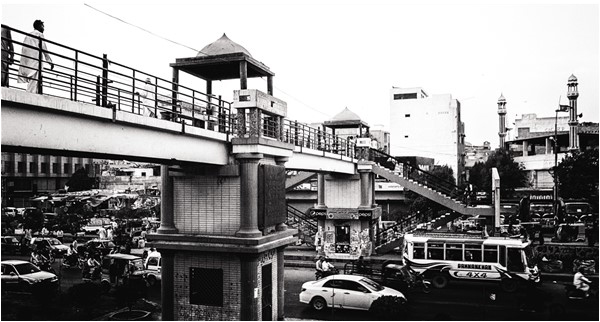
At the first crossroad, the light is red. As I stop and watch cars ignore and cross the signal, the car behind me is blowing its horn incessantly and flashing lights, asking me to move out of the way. Sadly, I cannot do so, as my car is not a plane or a helicopter that can fly over the car in front. While I wait for the light to turn green, I hear a knock on the window. It is beggar #1 of crossroad #1. He is using the stub of his amputated arm to knock on the window. I give him some money and pray that the signal turns green soon, so that beggar #2 of crossroad #1 does not have the time to reach me. This one is legless and rides a four-wheeler made out of a square-foot of wood. This sequence is repeated on all the following crossroads. By the fourth instance, I have given my last small bill to a lady who seems like she is 100 years old but approaches the car at a good trot.
Once the Grade 1 beggars have left, the Grade 2 variety appear at the window. These are what I call seller-beggars. They may appear as legitimate salespersons offering useful merchandise like a pack of twenty “azar bunds”, poor quality ballpoint pens, car cleaning cloth, balloons, stuffed monkeys, real monkeys, birds and mini religious books. As soon as you say a polite “no”, the self respecting businessmen turn into whining, groveling beggars. Most times you pay the money for the twenty-pack of “azar bunds” without actually taking one; after all you already have a dozen of such packs at home purchased from the same entrepreneur. If you think you have now paid your dues to society at large and can breathe in peace, you are wrong – as your vision is suddenly blocked by soapy water on your windshield. Welcome the squeegee kid! It is heartbreaking to see these little ones slaving away. But I must admit, with all the dust and filth in the air covering your windows, this is the most useful service offered on the roads and I usually accept it.
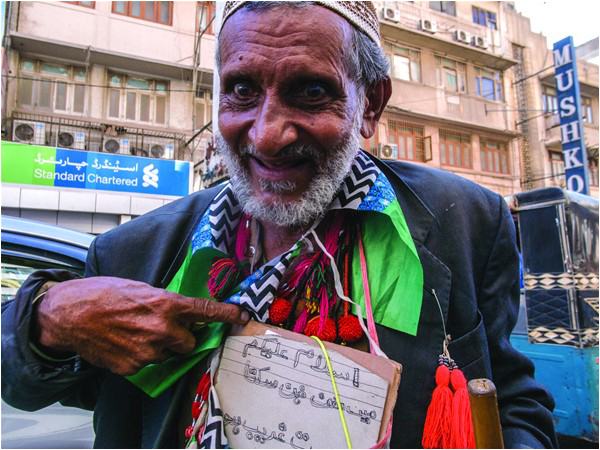
After negotiating the traffic nightmare called the KPT Interchange, where all modes of transport, powered by engines, animals, or humans, converge like a bunch of horses charging out of the starting gate at a derby, each jostling to get into an advantageous position to save the precious one second of their valuable time. The only calm ones in this mayhem are the policemen in their dirty white trousers held precariously over their fat bellies, who are busy extracting money from hapless motorcyclists.
I am now close to my place of work with just a bridge to cross. But what a bridge it is! This bridge is reputed to be haunted and bad spirits that have taken up residence on the bridge make sure that at least one large vehicle is stranded on it. This means that there is a traffic jam. The spirits are for some reason particularly active on Thursdays, when it is nearly guaranteed that a truck that has travelled without any problem all the way from Hazara loses a wheel or breaks an axle and is stranded in the middle of the bridge.
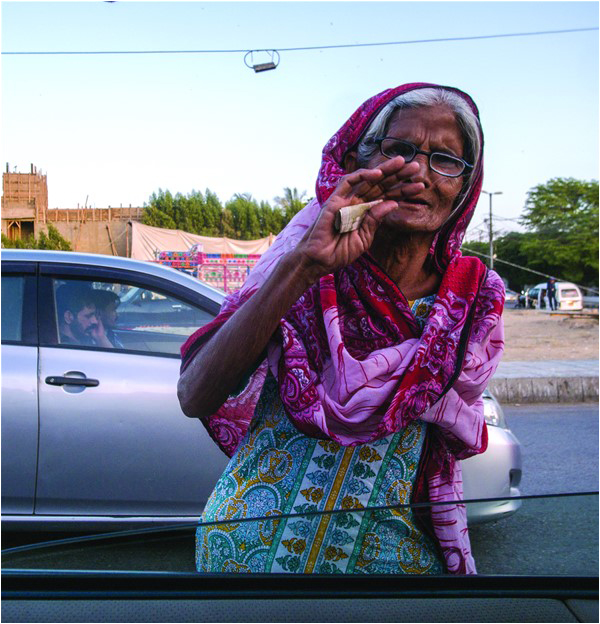
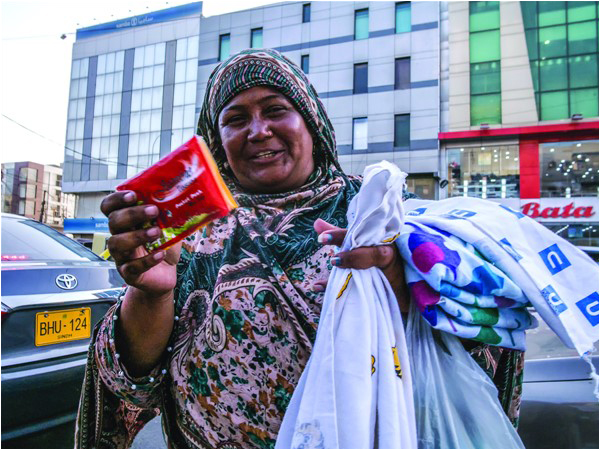
Ten minutes or an hour later I am at work. Luckily Ali Noor the tea boy is as efficient as ever. My spirits are revived. At 6PM I will set out for home: It will be an action replay of the earlier journey in reverse. I will arrive home to find someone has parked in my parking spot. In my fantasy I take a hammer and smash up the car like Gullu Butt. By the time I enter my apartment I am in a thoroughly foul mood. My wife, who has had her own share of the ride around town asks, “How was your day? And I hope you remembered to bring the rotis for dinner.” I have not brought the darned rotis. On a good day the matter is resolved by eating bread; on a bad day it starts a fight that ruins the rest of the day.
Our spiritual traditions tell us about “Pul e Siraat”, the bridge all will have to cross on the Day of Judgement if they want to enter Paradise. The catch is that the bridge is thinner than a hair, sharper than a sword and hotter than fire. Only the pious will manage to cross this bridge. I am convinced that the daily commute to work is a practice run for this final test.
I shave using bottled water and dab some deodorant and cologne in lieu of taking a bath.
I drive myself. My driver has gone back to his village to get his son married off. He has promised to return in two weeks. Six weeks have passed. He has borrowed a substantial amount of money from us for adding a room to his house for the newlyweds. The agreement is that small amounts will be deducted from his salary to pay back the loan. It will take five years. We have the same arrangement with our maid to help her buy a house. Since the amount is larger here, it will take fifteen years. Since I have no interest in getting my maid and driver and their children as bonded labour, I have effectively written off the loan as a contribution towards the social welfare of the country.

At the first crossroad, the light is red. As I stop and watch cars ignore and cross the signal, the car behind me is blowing its horn incessantly and flashing lights, asking me to move out of the way. Sadly, I cannot do so, as my car is not a plane or a helicopter that can fly over the car in front. While I wait for the light to turn green, I hear a knock on the window. It is beggar #1 of crossroad #1. He is using the stub of his amputated arm to knock on the window. I give him some money and pray that the signal turns green soon, so that beggar #2 of crossroad #1 does not have the time to reach me. This one is legless and rides a four-wheeler made out of a square-foot of wood. This sequence is repeated on all the following crossroads. By the fourth instance, I have given my last small bill to a lady who seems like she is 100 years old but approaches the car at a good trot.
Once the Grade 1 beggars have left, the Grade 2 variety appear at the window. These are what I call seller-beggars. They may appear as legitimate salespersons offering useful merchandise like a pack of twenty “azar bunds”, poor quality ballpoint pens, car cleaning cloth, balloons, stuffed monkeys, real monkeys, birds and mini religious books. As soon as you say a polite “no”, the self respecting businessmen turn into whining, groveling beggars. Most times you pay the money for the twenty-pack of “azar bunds” without actually taking one; after all you already have a dozen of such packs at home purchased from the same entrepreneur. If you think you have now paid your dues to society at large and can breathe in peace, you are wrong – as your vision is suddenly blocked by soapy water on your windshield. Welcome the squeegee kid! It is heartbreaking to see these little ones slaving away. But I must admit, with all the dust and filth in the air covering your windows, this is the most useful service offered on the roads and I usually accept it.

I will arrive home to find someone has parked in my parking spot. In my fantasy I take a hammer and smash up the car like Gullu Butt
After negotiating the traffic nightmare called the KPT Interchange, where all modes of transport, powered by engines, animals, or humans, converge like a bunch of horses charging out of the starting gate at a derby, each jostling to get into an advantageous position to save the precious one second of their valuable time. The only calm ones in this mayhem are the policemen in their dirty white trousers held precariously over their fat bellies, who are busy extracting money from hapless motorcyclists.
I am now close to my place of work with just a bridge to cross. But what a bridge it is! This bridge is reputed to be haunted and bad spirits that have taken up residence on the bridge make sure that at least one large vehicle is stranded on it. This means that there is a traffic jam. The spirits are for some reason particularly active on Thursdays, when it is nearly guaranteed that a truck that has travelled without any problem all the way from Hazara loses a wheel or breaks an axle and is stranded in the middle of the bridge.


Ten minutes or an hour later I am at work. Luckily Ali Noor the tea boy is as efficient as ever. My spirits are revived. At 6PM I will set out for home: It will be an action replay of the earlier journey in reverse. I will arrive home to find someone has parked in my parking spot. In my fantasy I take a hammer and smash up the car like Gullu Butt. By the time I enter my apartment I am in a thoroughly foul mood. My wife, who has had her own share of the ride around town asks, “How was your day? And I hope you remembered to bring the rotis for dinner.” I have not brought the darned rotis. On a good day the matter is resolved by eating bread; on a bad day it starts a fight that ruins the rest of the day.
Our spiritual traditions tell us about “Pul e Siraat”, the bridge all will have to cross on the Day of Judgement if they want to enter Paradise. The catch is that the bridge is thinner than a hair, sharper than a sword and hotter than fire. Only the pious will manage to cross this bridge. I am convinced that the daily commute to work is a practice run for this final test.

